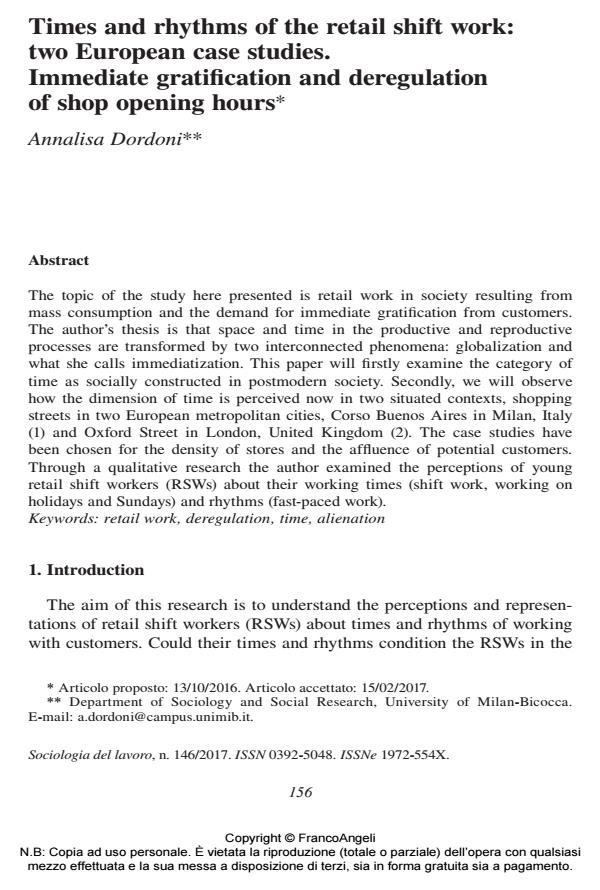Times and rhythms of the retail shift work: two European case studies. Immediate gratification and deregulation of shop opening hours
Journal title SOCIOLOGIA DEL LAVORO
Author/s Annalisa Dordoni
Publishing Year 2017 Issue 2017/146
Language English Pages 16 P. 156-171 File size 108 KB
DOI 10.3280/SL2017-146010
DOI is like a bar code for intellectual property: to have more infomation
click here
Below, you can see the article first page
If you want to buy this article in PDF format, you can do it, following the instructions to buy download credits

FrancoAngeli is member of Publishers International Linking Association, Inc (PILA), a not-for-profit association which run the CrossRef service enabling links to and from online scholarly content.
The topic of the study here presented is retail work in society resulting from mass consumption and the demand for immediate gratification from customers. The author’s thesis is that space and time in the productive and reproductive processes are transformed by two interconnected phenomena: globalization and what she calls immediatization. This paper will firstly examine the category of time as socially constructed in postmodern society. Secondly, we will observe how the dimension of time is perceived now in two situated contexts, shopping streets in two European metropolitan cities, Corso Buenos Aires in Milan, Italy (1) and Oxford Street in London, United Kingdom (2). The case studies have been chosen for the density of stores and the affluence of potential customers. Through a qualitative research the author examined the perceptions of young retail shift workers (RSWs) about their working times (shift work, working on holidays and Sundays) and rhythms (fast-paced work).
Keywords: Retail work, deregulation, time, alienation
- Organizational behaviour and firm performance: A study of Italian retail industry Riccardo Savio, in Risk Governance and Control: Financial Markets and Institutions /2021 pp.49
DOI: 10.22495/rgcv11i1p4 - Temporal Patterns in Management: Integrating Perspectives on Rhythms of Work and Organizing Omid Omidvar, Demetris Hadjimichael, Gary T. Burke, Igor Pyrko, Robert Chia, in Academy of Management Annals /2025 pp.861
DOI: 10.5465/annals.2024.0081
Annalisa Dordoni, Times and rhythms of the retail shift work: two European case studies. Immediate gratification and deregulation of shop opening hours in "SOCIOLOGIA DEL LAVORO " 146/2017, pp 156-171, DOI: 10.3280/SL2017-146010